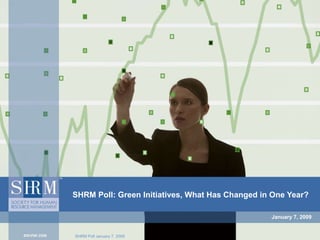
W010709 Green Workplace
- 1. January 7, 2009 SHRM Poll: Green Initiatives, What Has Changed in One Year?
- 3. Does your organization have a formal or an informal environmentally responsible policy? Note: Respondents who answered “Not sure” were excluded from the analysis.
- 4. Please indicate the practices your organization currently has in place (e.g., activities/programs) that could be considered environmentally responsible? Note: Percentages do not total 100% due to multiple response options. Data sorted in descending order by 2009 column. 59% 55% Partnering with environmentally-friendly suppliers/companies 59% 35% Encouraging/promoting/providing car pooling for employees 63% 59% Buying or leasing refurbished goods (e.g., refurbished toner cartridges; copiers, printers, fax machines, retread tires, re-refined oil) 63% 59% Promoting walking, biking, taking public transit 65% 49% Minimizing water consumption by using water-conserving plumbing fixtures (e.g., using faucet aerators, low flow toilets) 65% 63% Installing automatic shutoff for equipment 71% 73% Donating/discounting used office furniture/supplies to employees or local charity (e.g., set up a re–use area where employees can take unneeded supplies/materials rather than throwing them away and encourage staff to "shop" there) 73% 66% Using energy efficient lighting systems and equipment (e.g., occupancy sensors, ENERGY STAR® equipment, changing from desktops to laptops) 84% 83% Encouraging employees to work more environmentally friendly (e.g., by making more double-sided photocopies, powering down computers after few minutes of inactivity, using energy-efficient bulbs for desk lamps, ensuring blinds are lowered in the summer to conserve energy) 88% 83% Offering recycling program for office products (e.g., paper, Styrofoam, plastic, glass, cans) 2009 (n=180) 2008 (n=195) Top 10 Environmentally Responsible Practices
- 5. Which of the following does your organization do to demonstrate (to board, employees, public, etc.) its commitment to environmental responsibility? Note: Percentages do not total 100% due to multiple response options.
- 6. In general, what do you think are the main drivers of environmentally responsible programs for organizations? Note: Data sorted in descending order by 2009 column. Percentages do not total 100% due to multiple response options. Respondents were asked to select their top three choices. 2% 3% Shareholder activism 11% 18% Local/Federal regulations 16% 23% Public relations strategy 25% 24% Employee activism 30% 34% Health and safety considerations 53% 46% Economic considerations (i.e., saving money on operating costs) 55% 53% Environmental considerations 64% 69% Contribution to society (i.e., good corporate citizenship, ethical considerations) 1% 4% 7% 14% 17% 2009 (n=287) 4% 5% 11% 16% 15% 2008 (n=333) Market share improvement Local/Federal proactive initiatives Local/Federal incentives Consumer activism/grassroots pressure Competitive advantage
- 7. In general, what do you think are the main barriers of environmentally responsible programs for organizations? Note: Data sorted in descending order by 2009 column. Percentages do not total 100% due to multiple response options. Respondents were asked to select their top three choices. 32% 25% Lack of support by employees 14% 16% Lack of governmental support 7% 5% Concern organization will be held at a higher standard than competitors if there are lapses in organization’s stated values 35% 43% Lack of support by management 26% 84% 90% 2009 (n=287) 20% 74% 85% 2008 (n=333) Concerns about workplace inefficiency Cost of maintaining programs Cost of implementing programs
- 8. Which of the following has your organization achieved as positive outcomes of your environmentally responsible program? Note: Data sorted in descending order by 2009 column. Percentages do not total 100% due to multiple response options. Respondents were asked to select their top three choices. 7% 3% Increased recruitment of employees 16% 16% Increased employee loyalty 21% 14% Position as an employer of choice 20% 20% Increased consumer/customer confidence/choice 22% 19% Positive financial bottom line as a result of your organization’s environmentally responsible program 5% 4% Increased employee retention 41% 42% Stronger public image 12% 13% Gained a competitive advantage 12% 15% 46% 2009 (n=173) 6% 16% 44% 2008 (n=133) Increased workforce productivity Increased brand recognition Improved employee morale
- 9. Demographics 44% Large organization (500 or more employees) 29% Medium organization (100-499 employees) 27% Small organization (1-99 employees) Organization Staff Size (n = 359) 1% Telecommunications 1% Utilities 1% Publishing, Broadcasting, Other Media 1% Biotech 2% Association – Professional, Trade 2% Arts, Entertainment, Recreation Organization Industry cont’d 2% Services- Accommodation, Food & Drink places 3% Real Estate, Rental, Leasing 3% Insurance 3% High-Tech 4% Transportation/Warehousing 5% Retail/Wholesale Trade 5% Educational Services 5% Consulting 6% Other services 6% Financial Services 6% Construction/Mining 7% Government/Public Administration 9% Health Care 12% Services – Professional, Scientific, Technical, Legal, Eng 16% Manufacturing Organization Industry (n=282)